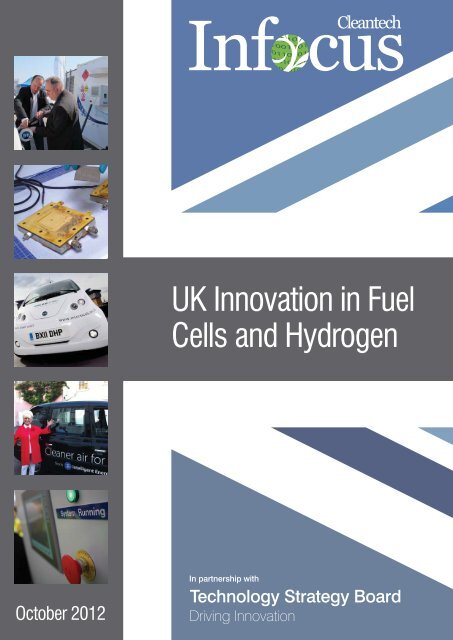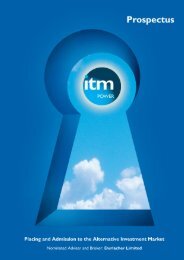Download - Cleantech Investor
Download - Cleantech Investor
Download - Cleantech Investor
You also want an ePaper? Increase the reach of your titles
YUMPU automatically turns print PDFs into web optimized ePapers that Google loves.
UK Innovation in FuelCells and HydrogenOctober 2012In partnership withTechnology Strategy BoardDriving Innovation
UK INNOVATION IN FUEL CELLS AND HYDROGENContentsEditor: Anne McIvor3 The Technology Strategy Board – stimulating innovation4 Removing barriers, reducing risk4 Profile: Intelligent Energy5 Profile: ACAL Energy6 Profile: Johnson Matthey Fuel Cells7 Profile:ITM Power7 Building a fuel cell and hydrogen supply chain8 Academic Collaboration8 Faster , Higher, StrongerEDITORIALANNE MCIVORDENIS GROSSMARGARET SCHLEIFERALEJANDRO OSORIO - Graphic DesignCONTACTEDITORIAL: editor@cleantechinvestor.com+44 (0) 20 7394 7110Fax. +44 (0) 20 7252 0910Every effort is made to ensure that content within this publication is reliable, but its accuracycannot be guaranteed. Any reliance you place on any of the material in this publication will beat your sole risk. The information provided in this publication may be out of date. Opinions areprovided on a general basis and should not be construed as a recommendation to buy sharesor other financial instruments. Readers are advised to undertake their own research and to seekadvice from a professional advisor before investing in equities, funds or any other instrumentsmentioned in this publication. <strong>Cleantech</strong> <strong>Investor</strong> Limited, or individuals associated with it, mayhold shares in companies mentioned in this publication and may from time to time performadvisory or other services for, or solicit business from, any company mentioned in this publication.Copyright: <strong>Cleantech</strong> <strong>Investor</strong> Limited, 2012.The recent success of Team GB in the London 2012Olympics was testimony to years of strategic investmentby the UK Government – combined with an element of‘home team advantage.’ International success in industry,as with sport, requires strategic investment on the part ofgovernment – and in this technological age, investment innew technology is key to a strong industrial base, with theassociated benefi ts of economic growth and job creation.The Technology Strategy Board, the UK’s governmentbackedinnovation agency, has adopted a unique approachto cultivating technology innovation. In this publication wereview its work within the clean technology sector of fuelcells and hydrogen.The Technology Strategy Board adopts, as its name suggests,a ‘strategic’ approach to the support of technologyinnovation. This approach, which governments elsewhereare considering replicating, aims to enable the cost effective,‘more bang for your buck’ roll-out of new technologies,products and services that meet global market needs andtackle societal challenges. And all with the aim of helpingto both accelerate growth and build the future economy.The examples in these pages, projects which have receivedsupport through the Technology Strategy Board over theyears, demonstrate the role of the organisation in helpingto bring new technologies closer to market.The UK looks set to become a signifi cant player in theemerging hydrogen economy as these industries now startto enter the mainstream - due, at least in part, to the focusprovided by the Technology Strategy Board.October 2012Technology Strategy BoardDriving InnovationThe Technology Strategy Board – www.innovateuk.org– is the UK’s innovation agency. Its goal is to accelerateeconomic growth by stimulating and supporting businessledinnovation. Sponsored by the Department for Business,Innovation and Skills (BIS), it brings together business,research and the public sector, supporting and accelerating the development of innovative products and servicesto meet market needs, tackle major societal challenges and help build the future economy.The organisation has a thematic programme of work that focuses on areas of global challenge (such as emissionsfrom transport, or ageing populations) and helps business to take advantage of the market opportunities thatthese create. It has identified five specific focus areas where innovation is led by societal challenge: energy,healthcare, built environment, food and transport.To complement these the Technology Strategy Board supports innovation in competences such as high-valuemanufacturing that enable the translation of technologies into new products, processes and services; andinnovation in the enabling technologies themselves such as advanced materials or ICT.Many Technology Strategy Board programmes have a clear theme of environmental or resource sustainability asa driver of innovation, and about two-thirds of its projects have a sustainability objective.More than simply a funding body, the Technology Strategy Board promotes innovation by encouraging collaborationand knowledge exchange, influencing policy and acting as a catalyst, bringing people together to drive innovativeideas forward towards commercialisation.s2www.innovateuk.orgOctober 2012
Technology Strategy BoardDriving InnovationUK Innovation in Fuel Cells and HydrogenThe role of the Technology Strategy BoardThe Technology Strategy Board has a wide remit. It focuseson innovation in many fi elds ranging from biosciences toaerospace, and from high-value manufacturing to the creativeindustries. However, since its establishment in 2007 theorganisation’s portfolio has included successfully investing infuel cells and hydrogen through its Energy Programme. Crucialto the success of the initiatives highlighted in this article hasbeen the way the Energy Programme has worked coherentlywith other relevant programmes in the investment portfolio,such as the Low Carbon Vehicles Innovation Platform and theMaterials for Energy programme. This joined-up approach isnow really showing results, with some of the world’s largestautomotive and utility companies beginning to partner withSMEs in Technology Strategy Board projects to develop thespecifi c energy technologies.These technologies play into several of the organisation’spriority areas – including energy, transport and sustainability.The earlier investments were part of research and developmentprogrammes in generic energy-related technologies, and builton previous work funded by the DTI, as it was then. Howeverfrom 2009 onwards attention narrowed to focus on strategicallyimportant technologies, including fuel cells and hydrogen.The fi rst dedicated funding for these technologies was quicklyfollowed by a fuel cell demonstrator programme fundedby the Department of Energy and Climate Change (DECC)and delivered by the Technology Strategy Board. Together,the Board and DECC have provided consistent innovationinvestment in this area over recent years.Richard Kemp-Harper, the Technology Strategy Board’sLead Technologist for Transport and Energy, points out thedifferences between its role and that of other organisationsworking in the cleantech arena. As the UK’s innovation agency,providing grant funding and other forms of innovation support,the Technology Strategy Board helps co-ordinate investment,networking and collaboration around low carbon technologies.He says: “What we do is to work with business to understandfuture directions and opportunities, then work to apply the righttools – and not just funding – to stimulate innovation.”The role of the Technology Strategy Board is not to deliverenergy policy; rather it is to ensure UK business benefi ts fromthe opportunities that policies and demand for innovation bring,and to focus limited funds on the greatest opportunities.These future opportunities often stem from major societal andglobal challenges, and the actions governments and regulatorsare taking to address them. This is what the Technology StrategyBoard calls the ‘challenge-led’ approach to innovation. Thewww.cleantechinvestor.comorganisation is also intent on helping the UK to take advantageof opportunities arising from new, disruptive technologies.To ensure that it invests in the areas most likely to generatesustainable UK economic growth, the Technology StrategyBoard applies four criteria:• Is there a global market for the technology?• Is there capability in the UK to roll out this technology?• Is the timing right for this technology?• Can the Technology Strategy Board make a difference?Fuel cells and hydrogen projects have typically scored wellover all four, and together with DECC the Technology StrategyBoard has invested £40 million in R&D in these technologies overthe last fi ve years. As this is ‘match funding’ for contributionsby the companies undertaking the R&D, this suggests thatinvestment in research and development of at least £80 millionhas been mobilised by the TSB’s leadership over this period.The Technology Strategy Board’s investments cover specifi cinnovation projects, not generic investments in companies orfunding for market launches. However moving a technologycloser to reality can be a major step towards making acompany investor-ready. Smaller companies also report thathaving Technology Strategy Board funding – perhaps througha feasibility study programme – can be a strong endorsementwhen it comes to seeking private sector investment.The Technology Strategy Board is also keen to point outthat across its portfolio it does not back one technology tothe exclusion of others. Its low carbon vehicles programme,for example, has invested in a wide range of projects withmarket potential, from increased internal combustion engineeffi ciency and lightweighting, to electric, hybrid and rangeextendedvehicles.However fuel cells and systems generating alternative energyvectors such as hydrogen are clearly an important part of thefuture mix. Although the UK market is not as well establishedas in some other countries, there are innovative businesseshere developing world-leading technologies. Solutions havebeen developed and successfully demonstrated. At the sametime, the cost and disruptive nature of these technologies aremajor barriers to commercialisation, particularly in areas suchas transport. The market cannot overcome these barriers onits own, and so the Technology Strategy Board aims to tacklethem by stimulating innovation - focusing on collaboration,reducing cost, integrating systems and supporting scale-up togreater volumes.s3
UK INNOVATION IN FUEL CELLS AND HYDROGENRichard Kemp-Harper believes the coherent approach takenby the Technology Strategy Board has helped to accelerate thegrowth of the businesses involved in its fuel cell and hydrogenR&D projects. The organisation has been a key partner forthese companies, and the other collaborators involved havealso been vital for their success. While the fuel cell and hydrogenindustry may have been the victim of infl ated expectations insome quarters, these stories amply demonstrate the UK’s abilityto encourage the development of robust clean technologycompanies in a sector with great potential.Removing barriers, reducing riskSince 2009 the strategic direction of the TechnologyStrategy Board’s hydrogen and fuel cells investments hasbeen following a deliberate path, tackling the barriers toinnovation - from developing technologies, to demonstrators,to whole systems integration, to reducing manufacturing cost,to storage technologies.For example, in 2008 and 2009 the focus was on encouragingdemonstrator projects, to close a signifi cant gap in the innovationProfi le: Intelligent EnergyTechnology Strategy Board support for projectsled by Intelligent Energy has enabled thecompany to reach key milestones on its path togrowth. The development of the Peugeot van,fuel cell taxi and Burgman scooter have enabledit to build strategic partnerships, showcase itstechnology and to be part of larger flagshipdemonstration projects, particularly HyTEC inLondon and the recently announced LondonHydrogen Network Expansion project.Background: Intelligent Energy’s origins lie in the late1980s, with the collaboration between LoughboroughUniversity’s Departments of Chemistry and Aeronautical and Automotive Engineering toestablish one of Europe’s first research and development teams in proton exchangemembrane (PEM) fuel cell technology. This resulted in the UK’s first kW-level PEM fuelcell stack, in 1995, and the subsequent spin-out of Advanced Power Sources (APS) Ltd.to specifically address the development and commercialisation of PEM fuel cells. APSpursued this course, with funds from UK Government bodies and often through jointdevelopment programmes with other commercial entities.The HyTEC fuelcell taxis whichtransportedVIPs at theLondon 2012Olympics weredeveloped withpart-funding fromthe technologyStrategy Board.In 2001 Intelligent Energy was founded and acquired APS, attracting private investorsand securing an irrevocable, worldwide licence to exploit all of both APS’s and theUniversity group’s fuel cell related know-how, in addition to all the key staff from bothentities. With the proceeds of further rounds of private financing, in 2003 IntelligentEnergy acquired US-based Element One Enterprises, a company with a substantialtrack record in hydrogen generation and hydrogen refueling technology, and, in 2004,MesoFuel Inc., a US specialist in developing small devices for converting liquid andgaseous hydrocarbons into hydrogen for energy storage and use in fuel cells.Technology Strategy Board Funding Highlights2010: £1.1m for the £3m Burgman fuel cell motorbike project involving Intelligent Energy,Suzuki and Loughborough University. The collaboration assisted in the achievement ofEuropean Whole Vehicle Type Approval for the fuel cell Burgman and the move by Suzukito commercialise fuel cell technologies for motorbikes and scooters.2008: Funding for Intelligent Energy fuel cell taxi project in collaboration with LotusEngineering, London Taxis International and TRW Conekt. That project led to involvementin the HyTEC (Hydrogen Transport for European Cities) project.2005: £1.7m for a three-year partnership between IE and PSA Peugeot Citroen,culminating in the delivery in 2008 of a light van demonstrator vehicle based on thePeugeot Partner Origin and powered by an electric battery with a hydrogen fuel cellrange extender which lifted vehicle duty cycle from 85km to 303km.Key <strong>Investor</strong>s: Credit Suisse Securities (Europe) Limited, Black River Commodity CleanEnergy Investment Fund LLC, Black River Global Equity Fund Limited, Meditor CapitalManagement Limited and Evolution Placements Corporation.Funding HistoryPrivate funding:2012: £22m (US$35m)at £2.3 per share (fullydiluted valuation ofc. US$0.5bn)2011: £7m ($11m) at £1.70per share2009: US$30m2007: US$17ms4www.innovateuk.orgOctober 2012
UK INNOVATION IN FUEL CELLS AND HYDROGEN- A project led by Air Products plc will create the UK’s fi rstend-to-end, integrated, green hydrogen production,distribution and retailing system, centred around a publiclyaccessible, state-of-the-art 700 bar renewable H2 refuellingstation network across London.- BOC Ltd will lead a project to deliver solar energy generatedhydrogen for Swindon’s existing public access H2 refuellingstation via an electrolyser, and its use in materials handlingvehicles and light vans at Honda’s manufacturing plant.- On the Isle of Wight, a project led by ITM Power willintegrate an electrolyser-based refueller with renewableenergy, enabling zero-carbon hydrogen to be produced foruse as a transport fuel for a range of vehicles.- Rutland Management Ltd, with project partners, will aim todemonstrate a viable solar-hydrogen energy system, withbenefi ts shared by multiple end users on a business parkin Surrey, through the 24/7 provision of green electricityand heat.- In Aberdeen, SSE plc is leading on the demonstration ofa whole renewable hydrogen system, connecting a 1MWeelectrolyser to the grid, in conjunction with a local wind farm,to explore the grid impacts and energy storage potential ofProfi le: Johnson Matthey Fuel CellsTechnology Strategy Board support hasenabled Johnson Matthey Fuel Cells to takeon projects with new partners, including smallbusinesses and universities, that would havebeen too risky otherwise. These partnershipshave led to new international businessopportunities for the company and its supplychain partners and have helped positionJohnson Matthey Fuel Cells well in the globalmarket for the components at the heart ofproton exchange membrane fuel cells.Background: Johnson Matthey Fuel Cells developsfuel cell components and has constructed theworld’s first dedicated manufacturing facility for membrane electrode assemblies(MEAs) for hydrogen and methanol fuelled systems, in Swindon in the UK, which alsohas a rapid prototyping capability for customers requiring pre commercial volumes.Johnson Matthey Fuel Cells is a division of Johnson Matthey, which in its own right isalso involved with related Technology Strategy Board projects.“We have beenable to take onprojects withnew partnersthat would havebeen too riskyotherwise.”Dr Jonathan Frost, Director,Johnson Matthey Fuel CellsTechnology Strategy Board Funding Highlights2009: £0.98m for a £2m project for novel processes and designs for high volume MEA/manufacture (in partnership with HumiSeal Europe, Marlin Precision Manufacturing andthe University of Bradford); 2009: £1m for a £2m project for component developmentfor improved MEA and stack stability (in partnership with Carlcarb, Intelligent Energy,Loughborough University, NPL Management, Technical Fibre Products and the Universityof Birmingham); 2009: funding for high performance low temperature direct ethanol fuelcells (in partnership with Queen’s University Belfast).2008: £0.54m of funding for a £1.1m project for Nano-Engineered Platinum CatalystLayers for Fuel Cells: a partnership between Johnson Matthey Fuel Cells (project leader),Qudos Technology, Teer Coatings and Thomas Swan. The aim was to develop microandnano-structured materials to enable a significantly increased oxygen reductionmass activity of platinum within fuel cell catalyst layers. 2007: £0.69m for a £1.6m ‘NovelDirect Methanol Fuel Cell MEA Technology for Electronics Applications’, aiming forbreakthroughs in MEA component technology for DMFC applications in electronics, withMantis Deposition, Technical Fibre Products and Reading University, 2007: £0.38m ofa £1.5m project awarded to Johnson Matthey Fuels Cells and Technical Fibre Productsfor the development of advanced electrode technology offering performance and costsavings for medium-temperature fuel cells for stationary power generation markets2005: £0.47m for a £0.96m project managed by Johnson Matthey Fuels Cells, ICIImagedata and the University of Surrey principally to develop a novel durable membranefor automotive applications, with the development of analytical techniques to characterisethem as a secondary objective.Johnson MattheyCode: JMAT:LNShare Price: £23.45Market Cap: £4.8bn12 month low / high:£15.41 - £25.79s6www.innovateuk.orgOctober 2012
Technology Strategy BoardDriving InnovationProfi le: ITM PowerITM Power’s experience shows the value of the rangeof support available across the Technology StrategyBoard programme. The company has been involvedin several Technology Strategy Board fundedprojects which have contributed to its developmentstrategy and accelerated the commercialisation ofits technology. These include Smart small businessawards, larger collaborative projects under theEnergy Programme, a demonstrator projectsupported by co-funders DECC and most recentlythe Ecoisland “Whole System Integration” project.Background: ITM Power, which is developing fuel cell andelectrolyser technology, was listed on the AIM market of theLondon Stock Exchange in 2004 at a price of 50p per share,valuing the company at £45.7million.“Funded projectshave playeda vital role inour growth asa technologybusiness.”Graham Cooley,CEO, ITM PowerTechnology Strategy Board Funding Highlights2012: £1.3m (for ITM Power) and £1m (for partners includingSSE, Toshiba, IBM, Cable & Wireless and the Universities of Glamorgan and Nottingham)for £4.66m Isle of Wight hydrogen energy storage and vehicle refuelling project, whichinvolves integrating a refueller for demand side load management. 2012: £0.16m forhydrogen gas inject feasibility study with Scottish Hydrogen Fuel Cell Association, KiwaGastec, Shell Research and National Grid - to assess the feasibility of injecting hydrogengas, generated from electrolysis fed from excess renewables, into UK gas networks.2011: £0.3m for three £0.1m research and development projects: Advanced MembraneProduction; Catalyst Improvements; and Power Supply. 2011: £0.07m to test andanalyse hydrogen storage hydrides as part of the Coated Metal Hydrides for EnergyStorage project, in partnership with E.ON, eminate, the University of Nottingham, TeerCoatings and Sunamp.2010: £0.34m for project to develop transportable high pressure hydrogen refuellingstation, supported by Gateway to London and Revolve Technologies, which resulted inthe HFuel® vehicle refueller and the Hydrogen On Site Trials (HOST) programme. HOSTbegan in 2011 and has involved Amey, RAC, Autoglass®, Isle of Man, UPS, SouthamptonCity Council, Center Parcs, Scottish Police Service, Vestas, Tarmac, May Gurney, SheffieldCity Council, the London Borough of Camden, Carillion, DHL, London Stansted Airportand the Forestry Commission. 2010: £0.25m for ITM Power for the CO 2reduction throughemissions optimisation project led by the Ford Motor Company, which aims to re-designthe internal combustion engine and exhaust system to minimise CO 2levels by using novelafter treatment techniques, and on-board generation and use of hydrogen.2008: Funding of £0.5m for HydroGEN project to develop alkaline polymeric membranematerials and catalysts to reduce the cost of electrolysers - in partnership with TeerCoatings, Boddingtons Technical Plastics and the University of Southampton.ITM PowerCode: ITM:LN (AIM)Share Price: 31.5pMarket Cap: £38.63m12 month low / high:30p/74.75phydrogen generation, and to use the hydrogen produced topower a fl eet of fuel cell buses.The projects also align very well with UKH2Mobility, the crossindustryand government initiative currently evaluating thepotential roll-out scenarios for hydrogen for transport in the UK.Building a fuel cell and hydrogen supply chainA key challenge for the fuel cells and hydrogen industry isthe development of a supply chain, which will be essential forwww.cleantechinvestor.comlarge scale commercialisation. Manufacturing and scale-upof new technologies often takes place at the point of inventionand creates local skills and products capable of profi ting fromwider global markets. The Technology Strategy Board wantsthat place of invention to be the UK.Building effective supply chains requires vision and close coworkingbetween the companies, large or small, that will formthe links. This is why the Technology Strategy Board sets suchstore by the collaborative research and development model,asking consortia of companies to bid together for projects.s7
UK INNOVATION IN FUEL CELLS AND HYDROGENAs the most recent projects show, there is a nascent supplychain in the UK in fi elds including automotive and stationaryfuel cells and materials handling - and evidence of commitmentto building it further. The Technology Strategy Board is workingtowards this goal, supporting companies in identifying strategicpartners and taking out costs.The Catapult centres being set up by the Technology StrategyBoard will also play a role in fuel cell and hydrogen innovationand supply chain development. World-leading innovation andtechnology centres in specifi c fi elds, the Catapults will forma transformational resource in which businesses work withresearch to commercialise new products, technologies andservices more rapidly.The fi rst Catapult, established last year, is in high-valuemanufacturing. It brings existing world-leading facilities togetherinto one centre and focuses on many competences which areof particular value to the fuel cell and hydrogen sector, suchas automation and assembly. Such capabilities will be vital forthe sector as it develops. There are key components neededfor fuel cell stacks and also for the ‘balance of plant’ for whichthere are as yet no cost-effective solutions; a huge gap whichoffers opportunities to UK companies if they can develop thetechnology required.Academic collaborationThe Technology Strategy Board is business-led andbusiness-focused, but academia is vital to the equation giventhe opportunity to pull ideas through from research towardscommercialisation. Collaborative research and developmentprojects frequently involve one or more universities workingclosely with companies. Connecting the innovation landscapeis a key role for the Technology Strategy Board, and thisinvolves maintaining and developing an excellent relationshipwith the research councils and the research base, for exampleby helping those companies which have challenges to formpartnerships with universities which may have potentialtechnology solutions.In the fuel cells and hydrogen area, the Technology StrategyBoard is to play an active role as an advisory board member ofthe Research Councils’ Energy Programme funded ‘SUPERGENHub’ for Hydrogen and Fuel Cells. The SUPERGEN initiative is afocus for academic research in these technologies; the Board’sinvolvement will help the Hub align the research it supports withbusiness innovation.Faster, higher, strongerIn 2012, the UK has been celebrating not only sportingsuccess but also signifi cant achievements in cleantechnology development. The Intelligent Energy fuel celltaxis, driving guests to the Olympic venues, provide just onevery visible example.The Technology Strategy Board is stimulating technologydevelopment, creating visibility of market opportunities,proving concepts, encouraging supply chain development andcontributing to the accelerated growth of businesses in thesector. Or, as the Olympic motto has it, encouraging “faster,higher, stronger” innovation – for the future of fuel cells andhydrogen in the UK and for economic growth.Technology Strategy BoardDriving InnovationFor more information on the Technology Strategy Board’s work,including its strategies, plans and forthcoming competitions,please see www.innovateuk.org.The right ‘tool’ for the jobThe Technology Strategy Board has a suite of tools andmechanisms which address the different needs of companieswishing to innovate and grow. These range from feasibilitystudies, to networking, to knowledge base partnerships. Hereare some examples.European and international activitiesSupport for businesses to access EU programmes for R&Dand innovation, for example through National Contact Points,experts who can advise companies on how best to apply tospecific programmes.Feasibility studiesHelp for companies, either singly or with others, to assess thepotential of ideas in specific thematic areas.Innovation vouchersA new scheme which enables smaller companies to engagewith new partners to access knowledge which could help theirbusiness grow. Vouchers are initially available for projects inagri-food, space and the built environment.Knowledge transfer networks and _connectKTNs accelerate business innovation by sharing knowledge,ideas and opportunities within and between sectors. Thesenetworks and others are hosted on the online community,_connect, at https://ktn.innovateuk.orgKnowledge transfer partnershipsAim to help improve business competitiveness by drawing onthe expertise in UK universities, colleges and other knowledgeproviders, placing a recently qualified individual in a businessto work on an innovation project.MissionsEntrepreneur missions in conjunction with UKTI, in which agroup of innovative and often early-stage UK companies travelabroad to meet potential collaborators, investors, suppliersand customers. The Clean and Cool Mission to San Franciscoin March 2012 focused particularly on clean technology. Seecleanandcoolmission.comSBRI (Small Business Research Initiative)Provides business with public sector procurement contractsto research and develop innovative products and services toaddress public sector challenges.SmartProvides pre-start-ups, start-ups, micro businesses andSMEs with grants to enable them to assess potential marketsand invest in R&D and innovation. The scheme is open forapplications at any time.s8www.innovateuk.orgOctober 2012









